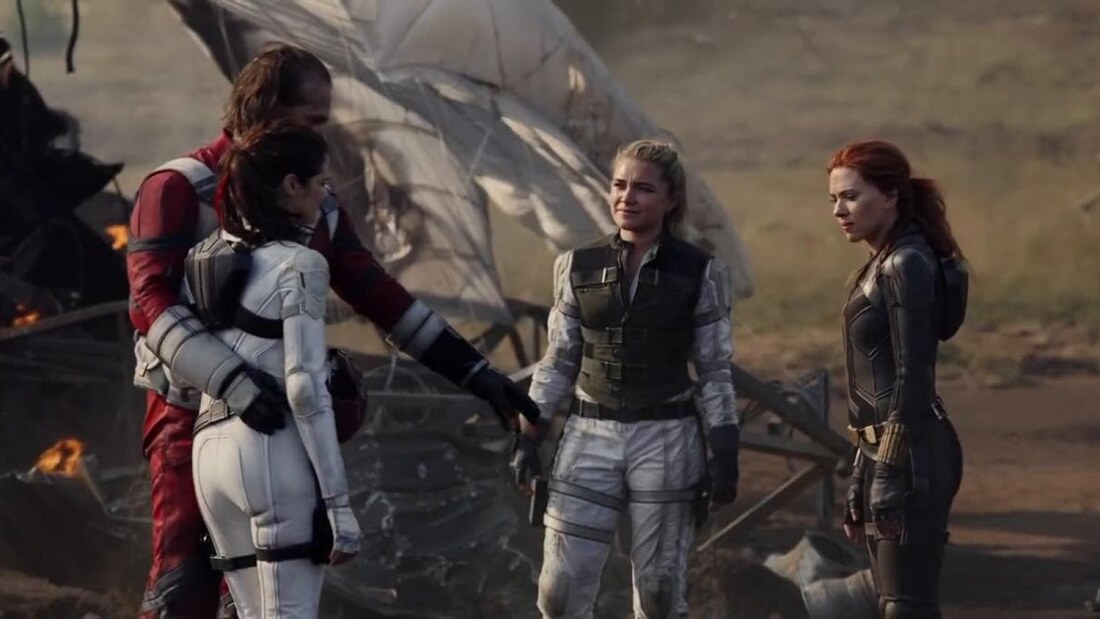Like any good spy film, Black Widow plays with how it doles out information and who is and isn’t a trustworthy character. This being a Marvel film, however, those reveals are limited by Disney dictates in how dark they can get. An early scene of the fake family embedded somewhere in the US heartland ends with the completion of their mission and the subsequent breakup of the family. Romanoff and Yelena, as young girls, take it as hard as one would expect, but Alexei and Melina are passive observers, at best, towards the subsequent indoctrination and surgical mutilation of their ‘daughters’ at the hands of the Red Room. The film, written by Eric Pearson, Jac Shaeffer, and Ned Benson, has to confront that decision and its resulting trauma as the family is reunited. As Alexei and Melina first praise Romanoff and Yelena for their high respective body counts, it appears that things are going to stay dark and morally twisted, as befitting a story theoretically rooted in Le Carre. Marvel likes to pretend that this or that entry is their version of some earlier cinematic subgenre, but there’s never a full commitment to, for instance, 70’s paranoid thrillers. That remains true here, even as Black Widow tiptoes towards as dark a tone as any Marvel film thus far. Alexei and Melina are the Soviet versions of Captain America and Black Widow, but the film can only talk about what that means in practice as opposed to showing it.
If Black Widow isn’t going for the double crosses and amorality of the spy drama, it is more in line with the Mission: Impossible franchise. The physicality of those movies are required here, where no one expect Alexei is superpowered and even he is overweight and out of practice after years of prison life. In that same vein, Dreykov doesn’t have an army of alien or robot goons whose dispatching makes the violence toothless. Shortland gives her film’s violence a viscerality that comes through even under the MCU’s PG-13 enforced limits. Bones get broken at weird angles, and brainwashed Black Widows are coerced to commit suicide if their caught. Conversely, big CGI moments are the film’s Achilles heel, placing Black Widow in a physical disadvantage compared to what it’s imitating as well as an intellectual one. Tom Cruise is really jumping out of planes in his Mission: Impossible films, and he’s setting the standard for the grandiose stunts that Black Widow, with its obvious green screens, cannot meet.
Where Shortland is on the surest ground is in the film’s quieter moments. She demonstrates herself to be an able constructor of tension in something a Marvel film never does, which is allow for silence. The aforementioned first confrontation between Romanoff and the assassin, later identified as Taskmaster, plays out like something from Blow Out, where Romanoff knows that something is off but she can’t determine exactly what it is. None of the bland MCU scores or dialogue intrudes upon the scene. Likewise, the film takes time to let the family confrontation play out, reestablishing roles the characters thought they discarded long ago and allowing their perspectives to organically come through. Shortland, an Australian director with three previous credits, is the most unknown directorial quantity that the MCU has onboarded thus far, as none of her earlier work has broken through in the US. Her effort most resembles that of Anna Boden and Ryan Fleck in Captain Marvel, another film where the grand action struggled and the most comfort was found in mundane settings. Black Widow appears to be another instance of Marvel’s competent in-house below-the-line directing unit coming in and making the action uniform and uninspiring, otherwise known as MCU-style.
Romanoff is freed from having to further her plotline in the MCU, so one might think a film about her at this stage of the franchise would be able to focus on her character. Instead, she becomes the least interesting of the four principal characters. As Black Widow becomes about destroying Dreykov and the Red Room, that’s a decision that Romanoff made years ago while everyone else needs to be convinced of it. Therefore, she has no dramatic arc, doubly so because she’s not going to enlist these characters to help her in the subsequent years of MCU storylines before her eventual death. If that’s bad for Johansson, it’s not the worst thing for the film itself thanks to the strength of these new characters. Pugh brings a sardonic fatalism to her character alongside a resistance to the mythmaking of MCU characters, a combination firmly in the wheelhouse of the broader franchise that also marks her as most comfortable going forward as a complement to other MCU characters or on her own. Harbour’s lusty exuberance is a fun kind of Russian stereotype, able to gleefully take punishment from big glugs of vodka or the fists of his enemies. Weisz has the meatiest role and she nails it. Melina has a humorlessness that Weisz has perfected in her work with Yorgos Lanthimos, and she flexes that muscle within a franchise that’s as un-Lanthimos as anything could possibly be.
Black Widow doesn’t do many favors by its titular character, including in a post-credits scene that undercuts her death as surely and consistently as the rest of the franchise has, but the film surrounding her is a pleasurable enough experience. With the recent addition of television series that are often underwhelming and underbaked, the MCU is quickly approaching a saturation point and a depressing level of sameness, where a thing is neither bad nor good but simply more. Black Widow could’ve been a respite from that, a self-contained part of the world unconnected from larger lore and future stories, but it’s instead subject to most of the same restrictions of all MCU films. Movies are supposed to better than fine. C+

 RSS Feed
RSS Feed